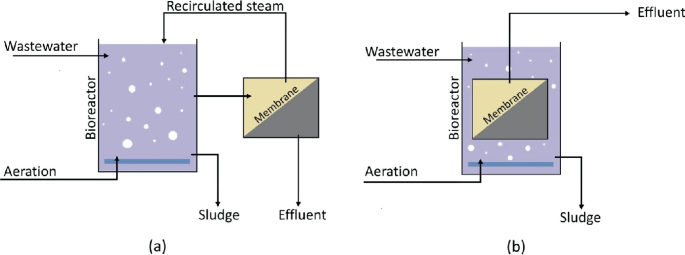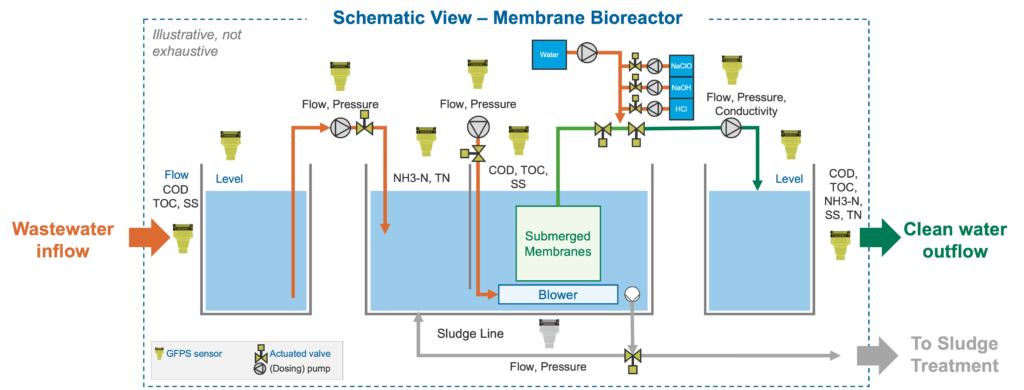The Advantages of Using a Membrane Bioreactor for Efficient Water Purification
The Advantages of Using a Membrane Bioreactor for Efficient Water Purification
Blog Article
Membrane Bioreactors Explained: Efficient Solutions for Tidy Water
Membrane bioreactors (MBRs) have actually emerged as an innovative option for addressing the pushing challenges of wastewater therapy - Membrane Bioreactor. By integrating biological processes with advanced membrane layer purification, MBRs not only improve the top quality of treated water however additionally minimize the spatial requirements of treatment centers.

What Are Membrane Bioreactors?
Membrane bioreactors (MBRs) are advanced wastewater therapy systems that incorporate organic destruction procedures with membrane filtration modern technology. This integration enables the reliable removal of pollutants from water, making MBRs a favored option in numerous applications, consisting of local wastewater treatment and commercial effluent administration.

Among the critical advantages of MBRs is their capability to generate high-quality effluent, typically appropriate for reuse in watering or commercial procedures. In addition, MBRs call for a smaller sized impact compared to conventional treatment systems, making them perfect for metropolitan settings where area may be limited.
Furthermore, MBRs can successfully manage differing influent tons and are less vulnerable to the impacts of hazardous shocks. These characteristics add to their growing appeal as a sustainable option for attending to the raising demand for clean water while reducing ecological effects.
Just How Membrane Layer Bioreactors Work
While the procedure of membrane bioreactors (MBRs) may seem facility, it essentially focuses on the harmony between organic procedures and membrane filtration. MBRs integrate an organic treatment procedure, usually triggered sludge, with a membrane layer separation device to treat wastewater effectively.
In an MBR system, wastewater is very first introduced right into a bioreactor where bacteria break down natural issue and various other contaminants. The organic activity decreases the concentration of pollutants while promoting the development of biomass. Following this organic treatment, the blended liquor goes through membrane layer filtration, which can be microfiltration or ultrafiltration, relying on the desired effluent top quality.
The membranes function as a physical barrier, enabling water and little solutes to pass while maintaining suspended solids and bigger molecules. This enables the system to keep a high focus of biomass within the reactor, improving the treatment performance.
Moreover, the continuous separation of treated water from the biomass assists in a small layout and minimizes the footprint of the treatment center. Overall, the mix of organic deterioration and membrane layer purification in MBRs causes reliable and reliable wastewater treatment, guaranteeing top notch effluent suitable for different applications.
Benefits of MBR Innovation
One of the vital advantages of membrane bioreactor (MBR) modern technology is its ability to generate premium effluent with a substantially lowered footprint contrasted to traditional wastewater treatment methods. MBR systems successfully incorporate organic therapy and membrane filtration, causing remarkable elimination of pollutants, including put on hold solids, microorganisms, and raw material. This ability brings about effluent that often Read More Here meets or goes beyond strict governing requirements for reuse and discharge.
Furthermore, MBR modern technology permits higher biomass concentrations, which improves the treatment efficiency and decreases the called for activator volume. This small design is specifically helpful in metropolitan areas where area is limited. The operational adaptability of MBR systems likewise suggests they can adjust to varying influent high qualities and circulation rates, making them suitable for a wide variety of applications.
Additionally, the lowered sludge production connected with MBR processes adds to decrease functional and upkeep costs. The membranes offer as a physical obstacle, reducing the threat of obstructing and making it possible for longer functional periods between cleaning. Overall, the advantages of MBR technology make it an attractive remedy for sustainable wastewater treatment, addressing both ecological problems and the demand for reliable resource monitoring.
Applications of Membrane Bioreactors
With their adaptability and efficiency, membrane layer bioreactors (MBRs) locate applications across numerous sectors, consisting of metropolitan wastewater treatment, commercial procedures, and even water improvement. In metropolitan settings, MBRs offer a portable remedy for treating wastewater, properly removing pollutants while simultaneously creating high-quality effluent that satisfies rigid governing standards. This makes them especially appropriate for locations with minimal room.
In industrial applications, MBR innovation is made use of for dealing with procedure water, specifically in sectors such as food and beverage, pharmaceuticals, and petrochemicals. These industries gain from MBRs' capability to manage high natural lots and their performance in recouping valuable sources from wastewater, such as nutrients and water.
Moreover, MBRs play an essential function in water improvement initiatives, enabling the reuse of treated wastewater for irrigation, commercial procedures, or also as safe and clean water after more therapy (Membrane Bioreactor). Their effectiveness in eliminating pollutants and virus makes them a dependable choice for ensuring water quality in numerous reuse applications
Future of Water Therapy Solutions
The future of water therapy remedies is positioned for transformative improvements driven by technological innovation and increasing ecological recognition. As global water deficiency ends up being a pressing concern, new approaches, consisting of membrane layer bioreactor (MBR) systems, are set to play a pivotal duty in improving the efficiency and sustainability of water therapy processes.
Arising innovations such as artificial knowledge and artificial intelligence are anticipated to enhance therapy operations, permitting real-time monitoring and anticipating maintenance. This will certainly improve the general reliability and efficiency official site of water therapy facilities. Advancements in membrane products, such as graphene and nanofiltration, assure to enhance permeation prices and lower fouling, leading to lower energy usage and functional prices.
Additionally, the combination of sustainable energy sources right into water treatment plants will contribute to greener methods. The round economic climate version will additionally gain grip, motivating the healing of useful resources from wastewater, such as nutrients and energy.
Conclusion

Membrane bioreactors (MBRs) have emerged as an advanced service for attending to the pushing obstacles of wastewater therapy. By incorporating organic processes with innovative membrane layer filtration, MBRs not only improve the top quality of cured water yet additionally lower the spatial needs of therapy centers.One of the Get More Info crucial advantages of membrane bioreactor (MBR) technology is its ability to produce top quality effluent with a substantially minimized footprint contrasted to standard wastewater treatment techniques.With their flexibility and efficiency, membrane layer bioreactors (MBRs) locate applications throughout numerous markets, including metropolitan wastewater treatment, industrial procedures, and also water improvement.In conclusion, membrane layer bioreactors stand for a considerable advancement in wastewater therapy innovation, integrating organic processes with efficient membrane layer filtering to produce high-grade effluent.
Report this page